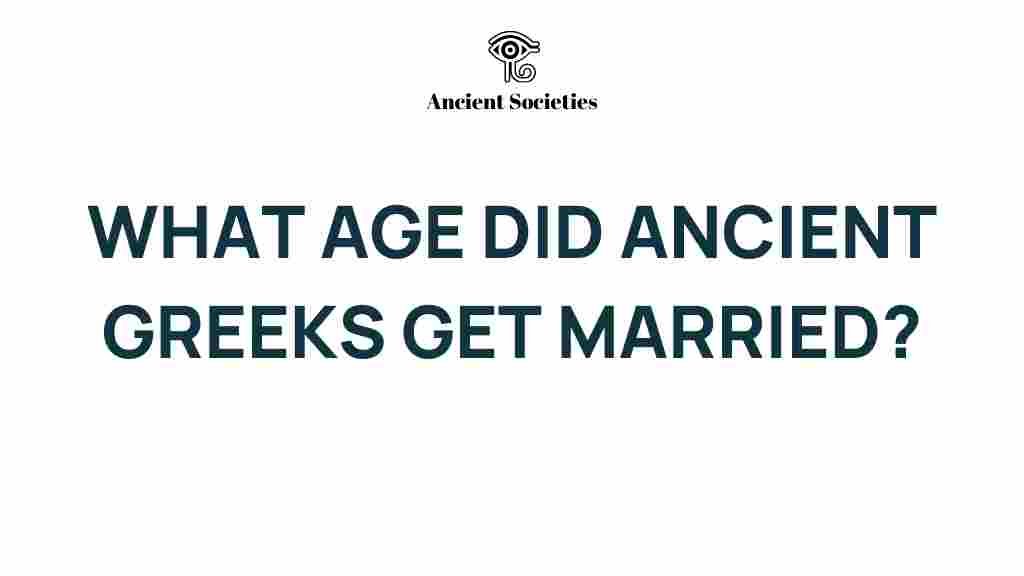Unveiling the Secrets: The Age of Marriage in Ancient Greece
In the annals of history, few societies have displayed the intriguing complexities of Ancient Greece. Renowned for its philosophical advancements, artistic achievements, and political innovations, Ancient Greece also had distinctive marriage customs that reflected its societal and cultural norms. This article delves into the historical age at which individuals typically married, examining the implications of these practices on society, culture, gender roles, and family structure. By uncovering these ancient traditions, we gain valuable historical insights into the lives of the people who shaped Western civilization.
Understanding Marriage in Ancient Greece
Marriage in Ancient Greece was not merely a personal affair; it was a significant social contract that served multiple purposes. It was primarily aimed at ensuring the continuation of family lines, securing alliances between families, and maintaining property within the family unit. The age of marriage varied across different city-states and periods, affected by factors such as social status, family wealth, and local customs.
The Typical Age of Marriage
In general, the age of marriage in Ancient Greece was relatively young compared to modern standards. Historical records suggest the following:
- Women: Typically married between the ages of 12 to 15. This early age was largely due to the expectation that women would bear children as soon as possible.
- Men: Generally married in their late twenties to early thirties, after establishing themselves financially and socially.
The disparity in age between husbands and wives was a reflection of the gender norms prevalent in Ancient Greek society. Women were often married off shortly after reaching puberty, while men were expected to be financially stable and mature before taking a wife.
Marriage Customs and Their Implications
The marriage customs of Ancient Greece were rich with rituals and traditions that highlighted the roles of both families involved. Here are some key customs:
- Arranged Marriages: Most marriages were arranged by families. The consent of the bride was often not sought, as her primary role was to fulfill familial duties.
- Dowries: A dowry was typically provided by the bride’s family, which was essential for the marriage negotiation process.
- Wedding Ceremonies: Weddings were grand events marked by various rituals, including sacrifices to the gods and feasting.
These customs underscored the importance of family and societal expectations, as marriage served as a means of enhancing family prestige and ensuring economic stability.
Gender Roles and Family Structure
The gender roles in Ancient Greece were rigidly defined. Men were the heads of the household and held public roles, while women were confined to domestic responsibilities. This division influenced the family structure significantly:
- Patriarchal Society: Men had authority in both the household and public life, while women were expected to manage the home and raise children.
- Motherhood: Women were primarily valued for their ability to bear children, particularly male heirs.
- Education: Girls received little to no formal education and were prepared for marriage from an early age, focusing on domestic skills.
This patriarchal system reinforced the societal norms that dictated the roles of men and women, shaping the familial dynamics of Ancient Greece.
Regional Variations in Marriage Customs
While the age of marriage and customs were fairly consistent across Ancient Greece, regional variations did exist. For example:
- Athens: In Athens, women typically married around 14, while men married around 30. The emphasis was on legal and civic responsibilities.
- Sparta: In Sparta, the customs were more egalitarian, with women enjoying more freedoms. Marriages were often based on breeding strong warriors.
- Corinth: Corinth had a more liberal approach, with women having greater agency in choosing their partners.
These differences highlight how local customs and societal values influenced the institution of marriage across various city-states.
Historical Insights into Marriage Practices
To truly appreciate the historical insights into Ancient Greek marriage, it is crucial to consider the broader implications of these practices:
- Societal Stability: Marriage was vital for maintaining social order, ensuring alliances, and managing property.
- Impact on Women: The early age of marriage and the lack of autonomy for women had long-lasting effects on gender equality.
- Legacy: The marriage customs of Ancient Greece influenced subsequent cultures and civilizations, shaping the evolution of marital practices in Europe.
These insights provide a lens through which we can understand the complexities of Ancient Greek society and its enduring legacy.
Challenges and Troubleshooting in Understanding Ancient Marriage Customs
Studying the marriage customs of Ancient Greece can present certain challenges:
- Scarcity of Sources: Many written records have been lost or were biased, making it difficult to get an accurate representation.
- Interpretations: Different historians interpret the same sources in varied ways, leading to conflicting narratives.
- Modern Bias: Contemporary views on marriage may color our understanding of ancient practices.
To overcome these challenges, it is essential to:
- Cross-reference multiple sources, including archaeological findings and literary texts.
- Engage with both classical and modern scholarly interpretations to gain a well-rounded perspective.
- Approach the study of ancient customs with an open mind, recognizing the cultural context of the time.
Conclusion
The age of marriage in Ancient Greece reveals much about the society and culture of the time. Through its distinct marriage customs, we see a reflection of the complex interplay between gender roles, family structures, and societal expectations. As we uncover these ancient traditions, we gain valuable historical insights that inform our understanding of human relationships across time. For those interested in diving deeper into the cultural practices of Ancient Greece, resources like this comprehensive guide can provide further exploration.
Ultimately, the study of marriage in Ancient Greece not only enhances our understanding of a pivotal civilization but also encourages us to reflect on our own societal norms and marital practices today.
This article is in the category History and created by AncientSocieties Team
